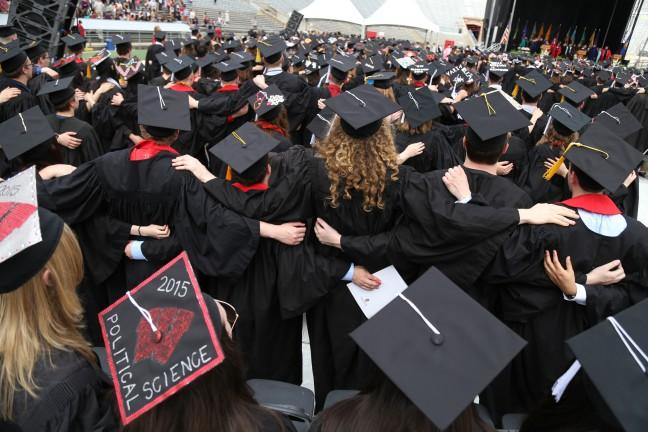University of Wisconsin’s Office of Academic Planning and Institutional Research released data showing UW students are decreasing their times to getting degrees as well as increasing the university’s retention rate.
Retention and graduation rates are key indicators of positive student experience and success, Associate Provost and Director of Academic Planning and Institutional Research Jocelyn Milner said. For UW, the retention rate increased from 95.3 to 95.8 percent, while the four-year graduation rate went up from 57 to 60.3 percent from the 2013-14 school year to the 2014-15 school year. Among major public research universities, the averages for these rates were 92 and 58 percent, respectively.
The university’s six-year graduation rate was calculated as 85.1 percent, while the average among peer institutions was 79 percent.
“There are both internal and external ways this is useful. We’re not the only ones who look at the peer data,” Milner said. “Some of the reputations at the university are stronger because of these ratings, but certainly when we have the success of having students graduate. It’s a sign things are working.”
It’s hard to credit the improvement in these ratings to a single factor since the university is constantly making “micro-changes” to different programs and policies, she said.
But Milner said one factor is the improvements to advising from the Office of Undergraduate Advising over the past five to 10 years. The increased investment in advising made an impactful turnaround possible, she said.
Wren Singer, interim associate dean of student academic affairs, said the investment has been effective because the Office of Undergraduate Advising is able to help advisors learn to do their job more effectively, while giving them the technology and systems needed to save time and better access information. Along with the investment in the preparation and training of advisors, the university also made an effort to hire more of them.
“I think it’s significant to be able to demonstrate that the university and students continue to improve in a way that’s visible and measurable,” Singer said. “There’re lots of great things we’re doing, but they’re not easy to measure. So I think it’s important and impressive to show those gains.”
Although the four-year rate improved three points, there’s work to be done bringing it up, Singer said. More intentional and intensive advising could be one reason students have been taking less time to earn their degrees, but another is creating a culture that four-year graduation is the norm.
But she said the university doesn’t want to get in the way of student’s education.
Milner said the four-year rate needs improvement because it says there’s something in UW’s academic programs that is keeping students from graduating at the four-year mark.
But taking more time to graduate isn’t a bad thing, as it may just mean a student’s progression was halted due to a learning opportunity elsewhere like an internship or studying abroad, Milner said.
“We want to continue the work we’re doing to have more students to graduate in four years,” Singer said. “So we still have more work to do, but it’s really encouraging to those who do this work every day that we’re making improvements that can be seen.”


